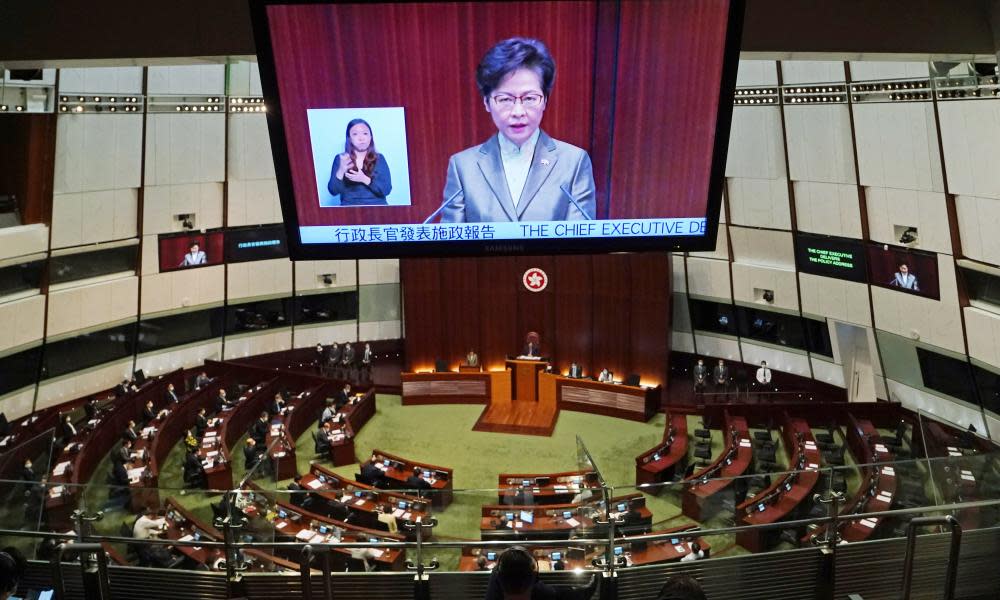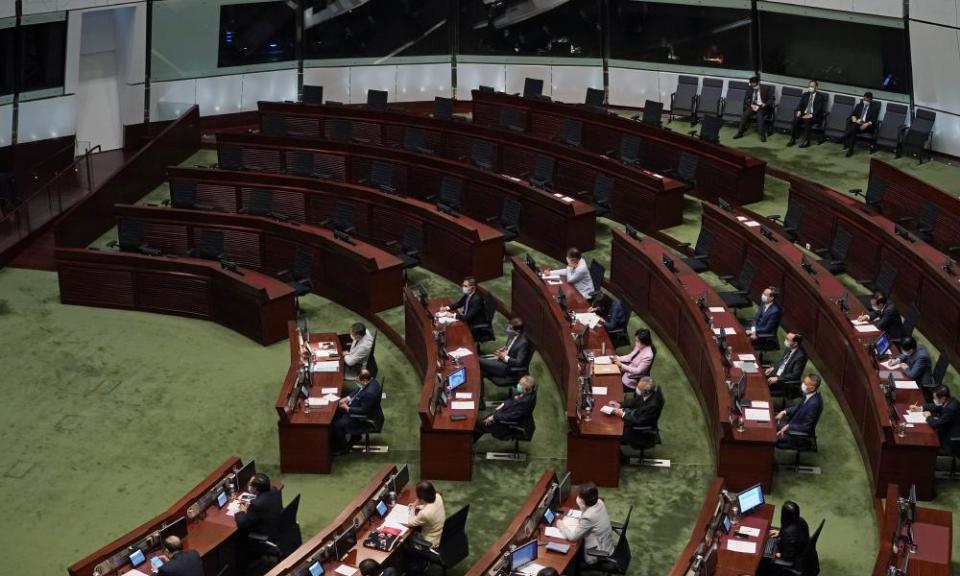'Remarkably effective': Carrie Lam praises Hong Kong national security law

Hong Kong’s chief executive, Carrie Lam, has defended the crackdown on opposition by her government and Beijing, and praised the widely criticised national security law – while seeking to blame the city’s woes on foreign interference and the pandemic.
Lam’s annual policy address – which was postponed from October to allow for further consultation with Beijing – was delivered on Wednesday to a legislative council without its opposition members after the mass resignation of the pro-democracy caucus.
Lam said Hong Kong had experienced “multiple blows” including the mass protests, a worsening economy and unemployment because of the pandemic, and “national security threats due to foreign interference”.
Related: Hong Kong activist Joshua Wong faces jail after guilty plea over police HQ protests
“In the past year or so Hong Kong has experienced the most severe political challenges since its return to the motherland,” Lam said.
She suggested the unrest was driven by “ill-intentioned people influenced by external forces”, and accused pro-independence or self-determination groups of having “blatantly challenged the authority of the central government and the HKSAR [Hong Kong Special Administrative Region] government, pleaded for interference in Hong Kong’s affairs by external forces and even begged for sanctions against Hong Kong”.
“Meanwhile, foreign governments and legislatures have intensified their interference in Hong Kong’s affairs which are squarely China’s internal affairs, severely jeopardising our nation’s security.”

Over the past 18 months Hong Kong’s semi-autonomy, guaranteed until 2047, has markedly deteriorated and the increasing involvement of Beijing in Hong Kong’s governance has led to cries that the “one country two systems” era is over. Mass protests wracked the city for most of 2019, sparked by opposition to an extradition bill before broadening out into a wider pro-democracy movement. A heavy-handed police response led the demonstrations into worsening violence.
More than 10,000 people have been arrested, including at least 31 under the national security law imposed by Beijing in June, which outlawed a wide range of acts as sedition, secession, foreign interference or terrorism. The internationally criticised law brought a chilling effect on Hong Kong, restricting the free expression of academics, media and the opposition. Other new or reinterpreted laws have also criminalised disrespect of the national anthem and allowed for the disqualification of elected lawmakers deemed to be “unpatriotic”.
On Wednesday Lam defended it all, saying Beijing had “no alternative but to step in and take action” with the national security law, which had been “remarkably effective in restoring stability”.
She said: “Advocations of ‘Hong Kong independence’ and collusions with external forces have progressively subsided; some of the prominent figures have kept a low profile; radical organisations have ceased operation or dissolved; those who are suspected of violating the law have absconded; and street violence is significantly on the decline.”
She said more than 2,300 people had been prosecuted for protest-related offences: police were prepared to handle underage cases with rehabilitative responses rather than punitive, but only if the defendants showed true remorse and admitted to their wrongdoing.
Lam also flagged a public education campaign on national security and law-abiding awareness, as well as legislative amendments to require all existing public servants to sign the loyalty oaths that have been required of new hires since July.
Once the pandemic stabilised, Hong Kong would launch a global publicity campaign to business and research industries. Lam said international confidence in Hong Kong’s law and freedom had been undermined by “the unreasonable criticism and smearing” of the national security law and disqualification of four pro-democracy legislators.


